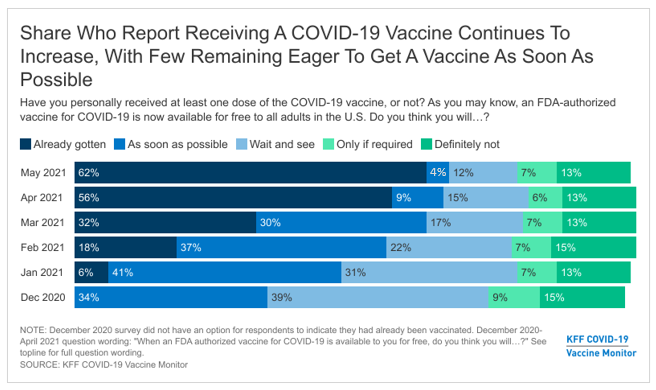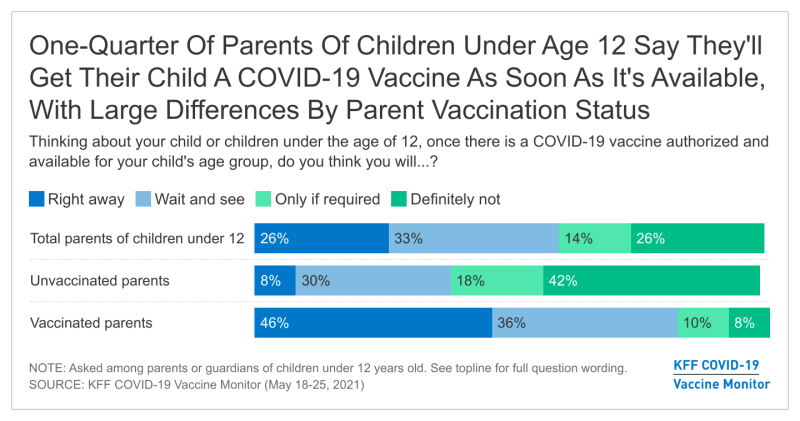
The independent source for health policy research, polling, and news.
Vaccine Monitor: Vaccination Rates Continue to Inch Upwards Across Groups, Especially Among Hispanic Adults, But Few Who Are Eager to Get a Shot Remain Unvaccinated
Full FDA Approval of Vaccines Emerges as a Potential Motivator for Many to Get Vaccinated
4 in 10 Parents Say Their Adolescent Children Have Already Gotten a Shot or Will Do So Right Away; One Quarter of Parents of Children Under 12 Will Get Them Vaccinated as Soon as They Are Eligible
Few Unvaccinated Adults Say that CDC’s Guidelines for Vaccinated Adults Make Them More Likely to Get a Shot
Nearly all adults who are eager to get a COVID-19 vaccine now have already gotten at least one shot as COVID-19 vaccination rates inch higher this month, with the biggest increase among Hispanic adults, a new KFF COVID-19 Vaccine Monitor report finds.
The report shows that 62% of adults say they have gotten at least one dose, up from 56% in April, while the share who say they want to get a shot “as soon as possible” dipped from 9% in April to 4% now.
An additional 12% say they want to “wait and see” how the vaccines work for others before getting a shot themselves, down slightly since April (15%). Within the wait-and-see group, about a third (36%, or 4% of all adults) say they have already scheduled an appointment to get vaccinated or plan to do so within the next three months. If this group and those who want a vaccine “as soon as possible” follow through and get a vaccine, it could push the overall vaccination rate for adults to 70% over the summer.
“At this point, there’s almost no low-hanging fruit, but there’s a path toward a slow-but-steady increase in vaccination rates through improved access, information, persuasion and incentives,” KFF President and CEO Drew Altman said.
The size of the two most reluctant groups also remains largely unchanged from April, with 7% saying they would get vaccinated “only if required” for work, school or other activities, and 13% saying they will “definitely not” get vaccinated.
Self-reported vaccination rates inched up across most demographic groups, including among Hispanic adults (57%, up from 47% in April) and adults without college degrees (55%, up from 48%). At least half of adults across most demographic subgroups now say they have gotten vaccinated.
One group whose enthusiasm appears to have stalled over the past month is Republicans, among whom about half (49%) say they’ve gotten at least one dose of a vaccine and 27% say they will “definitely not” get vaccinated.
With adolescents ages 12-17 now eligible to get a COVID-19 vaccine, 4 in 10 (41%) parents with kids in that age range say their child has already received at least one dose (24%) or will get one right away (18%).
Parents of younger children who are not yet eligible for a vaccine are less eager at this stage. About a quarter (26%) say they will get their child vaccinated as soon as they are eligible, while a third (33%) say they will wait and see how well it works for others first. Smaller shares say they would get their younger children vaccinated only if required (14%) or would definitely not get them vaccinated (26%).
Parents’ views about the COVID-19 vaccine don’t necessarily reflect broader vaccine concerns. Just 11% of parents overall say that they have ever delayed or skipped other vaccines for their children.
Full FDA Approval of a COVID-19 Vaccine among Biggest Potential Motivators
There are currently three COVID-19 vaccines available in the United States under an emergency use authorization from the Food and Drug Administration (FDA). One significant potential motivator for people would be if the FDA were to grant full approval to one or more of those vaccines.
The Monitor finds that 32% of unvaccinated adults, including 44% of those in the wait-and-see group, say they would be more likely to get vaccinated if a vaccine received full FDA approval.
In addition, 1 in 5 (21%) of those who are employed and unvaccinated say they’d be more likely to get a vaccine if their employer gave them paid time off to get vaccinated and recover from any side effects.
Other potential motivators to encourage vaccination could have a more modest impact on unvaccinated adults’ willingness to get vaccinated. These include being offered $100 from their state government (15% say this would make them more likely to get vaccinated); being offered free transportation from a ride-share company (13%); free tickets to a sporting event or concert (11%); and being offered a $20 coupon for food or drink (10%).
These incentives are somewhat more likely to influence some groups where vaccination rates to date have lagged, including Black and Hispanic adults, and those with lower household incomes.
4 in 10 Say the CDC’s Guidance on Safe Behaviors is Confusing
The monitor also gauges the public’s initial reaction to the May 13 guidance issued by the Centers for Disease Control and Prevention (CDC) that fully vaccinated people do not need to wear a mask or physically distance in most circumstances.
Among the public overall, a majority (54%) says the CDC’s guidance is clear and easy to follow, while just over four in ten (43%) say the guidance is confusing and hard to follow. The split is similar among both vaccinated and unvaccinated adults. Among partisans, Republicans are somewhat more likely to say the guidance is confusing (56%) than Democrats (39%) or independents (37%) are.
Among those who are unvaccinated, a large majority (85%) say the CDC’s guidance does not affect their enthusiasm for getting vaccinated, though one in ten say that it makes them more likely to do so and a small share (4%) say it makes them less likely.
Designed and analyzed by public opinion researchers at KFF, the KFF Vaccine Monitor survey was conducted from May 18-25 among a nationally representative random digit dial telephone sample of 1,526 adults. Interviews were conducted in English and Spanish by landline (248) and cell phone (1,278). The margin of sampling error is plus or minus 3 percentage points for the full sample. For results based on subgroups, the margin of sampling error may be higher.
The KFF COVID-19 Vaccine Monitor is an ongoing research project tracking the public’s attitudes and experiences with COVID-19 vaccinations. Using a combination of surveys and qualitative research, this project tracks the dynamic nature of public opinion as vaccine development and distribution unfold, including vaccine confidence and acceptance, information needs, trusted messengers and messages, as well as the public’s experiences with vaccination.

